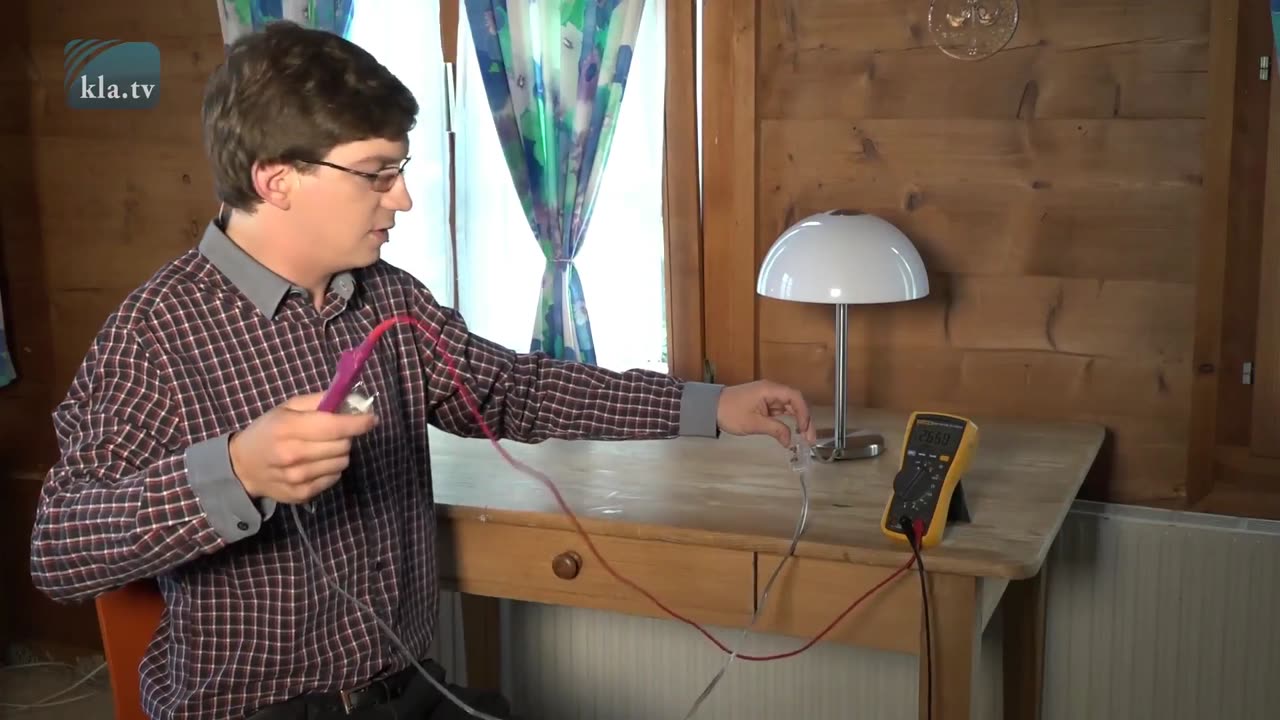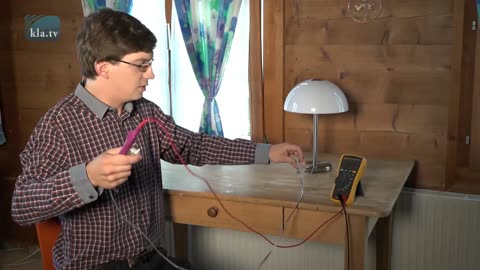Premium Only Content

Low frequency - Protective measures against wireless radiation in everyday life (Part 6)
Low frequency - Protective measures against wireless radiation in everyday life (Part 6)
Well, hello! Glad you are here. Today I will do a low-frequency measurement with you and will show you how you can bring the low-frequency radiation as low as possible in your bedroom, living room, in your own house.
One more thing to keep in mind: Our heart operates on a natural voltage of 50-150 mV.
This is a low-frequency measuring device that measures the electromagnetic voltage in the air. Now I switch it on and I approach the socket very close. You can see and you can hear that the device deflects and an increased value is shown.
Now we go back slowly with the measuring tool. And now we see: The electromagnetic field decays extremely fast the further you move the meter away from the socket.
This means: If we go further away, we have a voltage value of almost 0 mV . Now one might think that if we have such a value in the bedroom, here near the bed: Everything is fine.
Only, the problem is, the device only measures the voltage in the air. For the body tension I use a normal multimeter, a digital multimeter.
With this you can measure the body tension, how much our body is electrically charged. Before we start a measurement, we always have to hold in our hand such a metal band or simply something conductive, which is connected to the multimeter. This way I can see the tension I have in my body. We remember briefly, when I said at the beginning that the heart works with 50 to 150 mV. And we see a voltage of 5100 mV. This value is far too high . It kind of competes with our hearts. And it puts our bodies under a lot of stress.
Everything that is conductive also passes on this tension. This here is metal . Now I touch this and we see , the volt figure goes up again very steeply to 12 000 mV.
Let me show you a very simple example of how to reduce a lot of the tension in the workplace.
Now I'm going to touch this cable. The voltage goes up to 18,000 mV. That's extremely high. considering that the heart is operating at 50-150 mV...
What you can do is to turn the plug. I reverse it now .and I touch the cable again and the value is at 4000 mV.
Why is that so? The plug has two poles. The current flows through one pole. Now the current comes from here and goes past the switch here, then it goes back into the lamp, turns around here and comes back again.
This means I have a much, much higher voltage here. If I reverse the plug, the current comes only as far as the switch here and doesn't go through the lamp and back again. This way the antenna is much shorter.
Ok! Now, at the end of the day everyone goes to sleep and now let's check the value for her. Here we have 3700 mV now. Our heart works with 50 to 150 mV. This is far too high, especially for sleep.
Well, let's have a look at why these values are so extremely high.
Now here I have a bedside lamp, and it's not on. It is just plugged in now. And I placed the cord here on the bed.
Now let's check the values, if we just unplug this cable : 2800 mV voltage. Why is that?
Any cable with two poles and current is flowing , more precisely alternating current, these cables radiate extremely. Here's what you can do about it: You can shield every cable.
This means that these cables must be removed and replaced with shielded cables.
These shielded cables have an extra layer of aluminum inside to eliminate low-frequency radiation.
Additionally there is this grounding conductor, which is connected to the plug here at the grounding pole.
Now just touch the lamp. We can see that the value rises to 17000 mV. Why is this? Anything made of metal, the whole housing, here the front part, is not grounded.
Which means, also the person is conductive. She has water in her body. You can see the readings are extremely high.
OK, you can let go again.
With this lamp we have shielded the cable and grounded the lamp housing and let's see how the values behave here: A value of 2,500 mV.
Now hand me this please. And let's see what happens when I touch the housing of the lamp here: The value goes down to exactly 130 mV. Why is that?
I soldered the separate ground wire of the shielded cable to the lamp housing so that it holds well and now this lamp is grounded.
If the value is still too high and you can't sleep or you just feel you have to go even lower with the value, you can ground yourself.
Almost every water tap is grounded. Because water pipes go deep into the ground and all voltage flowing into the soil is gone because the earth has a potential of 0 mV.
But, if you have a plastic faucet, it won't work because plastic is not conductive.
It's exactly the same with the lamp. A plastic lamp housing cannot be grounded because plastic is not conductive.
Now let's see: Here I have a value of myself of 2700 mV. And now I touch this tap. The value is gone. The voltage goes into the soil.
What you can do to get fully grounded while you sleep is you can connect a wire to the tap here.
It just has to be conductive. You can attach it anywhere on your body, like wrap it around a finger or a toe, or stick it anywhere to your body.
It simply needs to have enough good contact with the skin. Now the value is almost at 0 mV.
In many houses, the heating systems are not properly grounded. This means that they also release an enormously high voltage charge to humans. You can simply wrap a wire around a water tap and then fix it around a bare spot on the heater.
Now let's check my value. Here I have a voltage of 3100 mV. Now I touch the grounded heater and the reading drops to 100 mV.
And again we remember the beginning: The heart works with 50 to 150 mV. That means this value is very good. It would be a very good value for sleeping.
Now I'll show you what would be the very best thing to do for sleeping and how you can recover best: Switch off the fuse. Nothing helps as much as simply switching off the fuse.
And we see the value is below 100 mV.
For sleeping this is an absolutely perfect value and you can recover well at night and you won't get up in the morning more broken than when you went to bed.
Yes, that was a small workshop on how you too can keep the low-frequency radiation as low as possible at home.
-
 5:19:50
5:19:50
SLS - Street League Skateboarding
8 days ago2024 SLS Tokyo: Women’s and Men’s Knockout Rounds
491K14 -
 2:51:00
2:51:00
Fresh and Fit
7 hours agoWomen Claim To Give Better Dating Advice So We Did THIS...
115K67 -
![[F EM UP Friday] Take # 2 [Destiny 2] Lets Kick Some A$$! #RumbleTakeOver](https://1a-1791.com/video/s8/1/c/W/7/1/cW71u.0kob-small-F-EM-UP-Friday-Take-2-Desti.jpg) 5:16:50
5:16:50
CHiLi XDD
8 hours ago[F EM UP Friday] Take # 2 [Destiny 2] Lets Kick Some A$$! #RumbleTakeOver
37.3K1 -
 5:13:43
5:13:43
ItsMossy
14 hours agoHALO WITH THE RUMBLERS (: #RUMBLETAKEOVER
34.2K1 -
 1:54:08
1:54:08
INFILTRATION85
8 hours agoHi, I'm INFILTRATION
34.2K9 -
 7:51:03
7:51:03
GuardianRUBY
9 hours agoRumble Takeover! The Rumblings are strong
72.3K3 -
 4:28:45
4:28:45
Etheraeon
17 hours agoWorld of Warcraft: Classic | Fresh Level 1 Druid | 500 Follower Goal
51.1K -
 3:17:21
3:17:21
VapinGamers
9 hours ago $3.73 earned🎮🔥Scrollin’ and Trollin’: ESO Adventures Unleashed!
34.9K2 -
 LIVE
LIVE
a12cat34dog
10 hours agoGETTING AFTERMATH COMPLETED :: Call of Duty: Black Ops 6 :: ZOMBIES CAMO GRIND w/Bubba {18+}
273 watching -
 8:23:18
8:23:18
NubesALot
12 hours ago $5.29 earnedDark Souls Remastered and party games
30.3K
